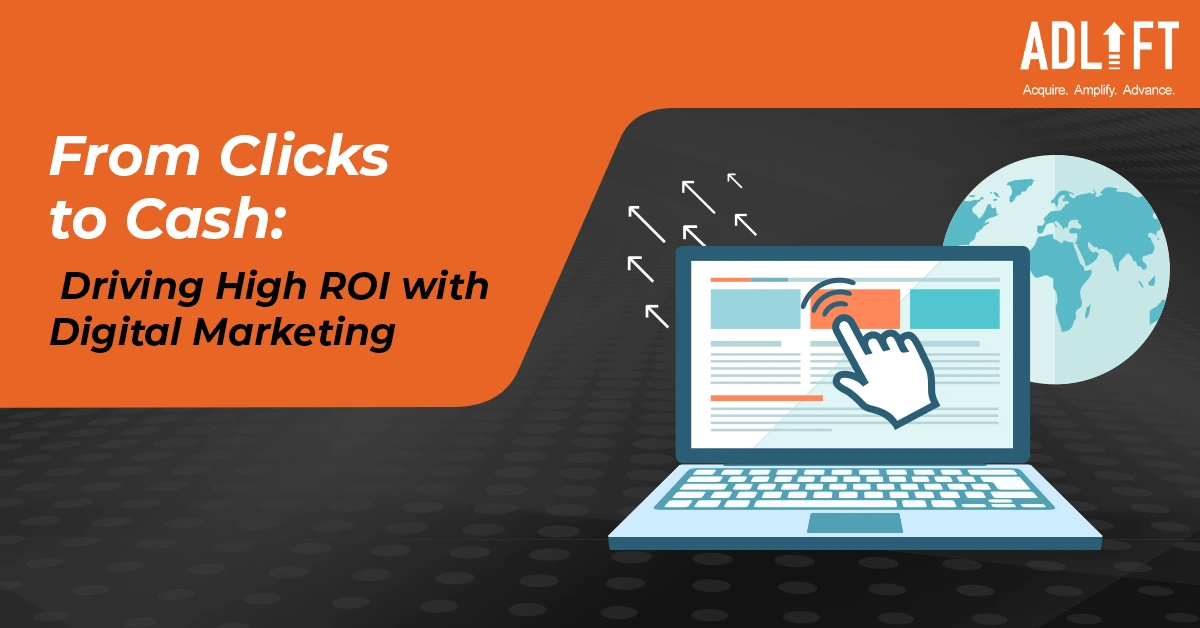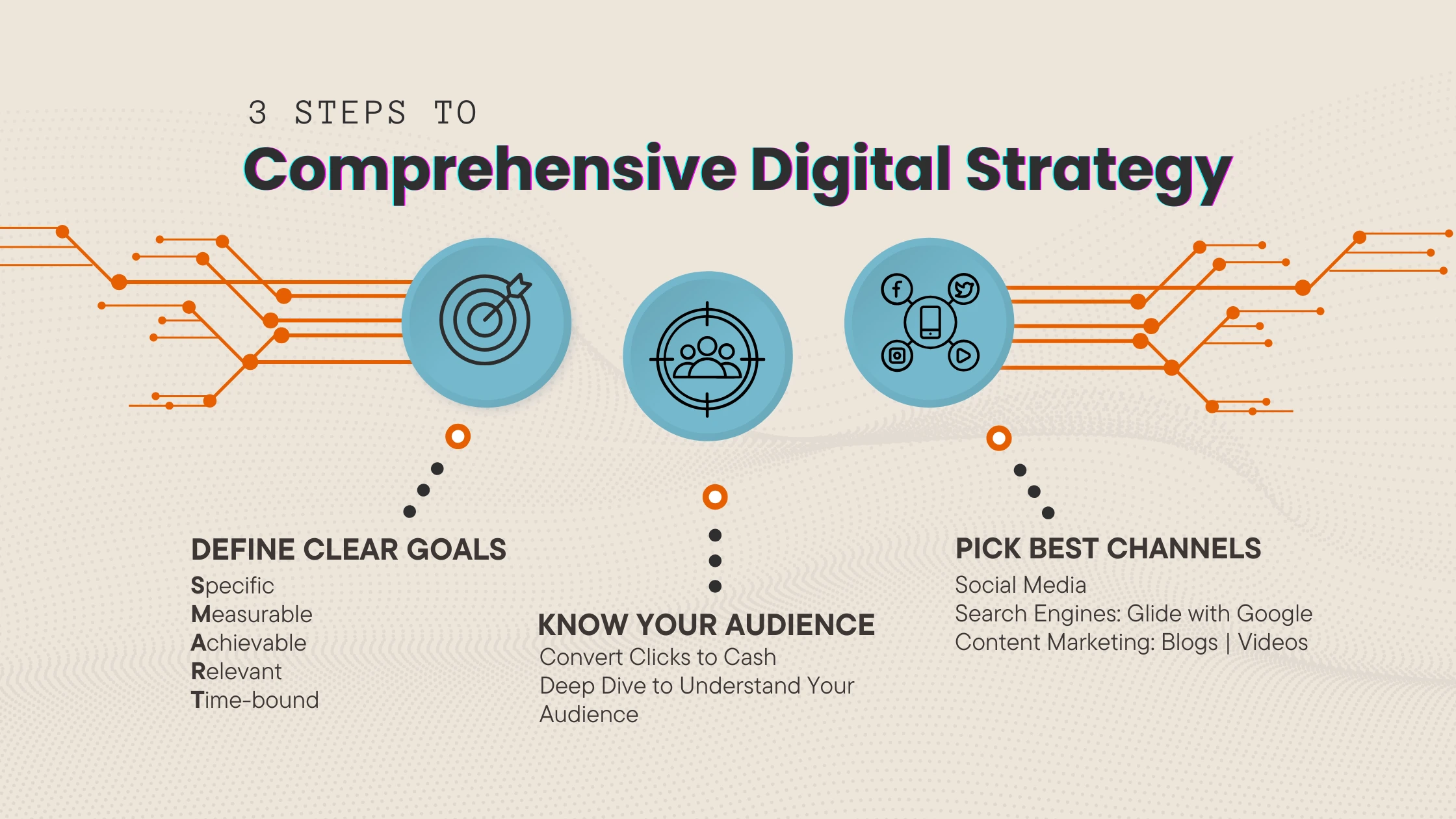From Clicks to Cash: Driving High ROI with Digital Marketing

So, you know how everything’s all fast-paced and connected nowadays? Well, that’s where a digital marketing agency swoops in changing how businesses chat with their peeps and make that sweet moolah. We’ve gone from old-school marketing tricks to the digital strategies that open up chances for brands. And guess what? One of the big boss goals for businesses is scoring a killer Return on Investment (ROI). This article is all about the ROI in digital marketing. We will also be discussing the turning clicks into cash and strategies that make digital marketing services money-making wizardry.
Understanding the Digital Landscape
Digital marketing agency encompasses a wide range of strategies, including search engine optimization (SEO), social media marketing, pay-per-click (PPC) advertising, email marketing, content marketing, and more. The common thread among these strategies is their ability to reach a global audience instantaneously and deliver measurable results.
Setting the Foundation: A Comprehensive Digital Strategy
Defining Clear Goals: Your goals should be specific, measurable, achievable, relevant, and time-bound (SMART).
Understanding Your Audience: To effectively convert clicks into cash, you need to understand your target audience.
Choosing the Right Channels:Depending on your industry and audience, you might find success with social media platforms like Facebook and Instagram, search engines like Google, or content marketing through blogs and videos.
The Conversion Funnel: Turning Clicks into Leads
A well-structured conversion funnel is the heart of driving ROI in digital marketing. It’s a step-by-step process that guides your audience from the initial click to making a purchase, turning them into paying customers.
Awareness: At the top of the funnel, your goal is to create awareness about your products or services. This is where engaging content, social media posts, and SEO strategies play a crucial role. By attracting potential customers to your website, you lay the foundation for future conversions.
Interest and Consideration: As visitors engage with your content, they move deeper into the funnel. This is the stage where you provide more detailed information about your offerings, showcase their benefits, and address any concerns. Case studies, product demos, and comparison guides can be powerful tools for helping you with ROI in digital marketing.
Decision: At this point, your prospects are evaluating whether to make a purchase. Offer compelling calls-to-action (CTAs), such as limited-time discounts or free trials, to nudge them towards the decision. Ensure that your website is user-friendly and optimized for smooth navigation.
Action: The final step is getting your visitors to take action, whether it’s making a purchase, signing up for a newsletter, or requesting a quote. Streamline the process as much as possible and make it easy for them to convert.
Data-Driven Decision-Making
One of the greatest advantages of digital marketing agency is the wealth of data it provides. Every click, impression, and conversion can be tracked and analyzed, offering valuable insights into what’s working and what needs improvement.
Analytics Tools: Utilize analytics tools like Google Analytics, Facebook Insights, and email marketing platforms to monitor key metrics. These tools provide information about website traffic, engagement rates, conversion rates, and more.
A/B Testing: Experimentation is key to refining your strategy. A/B testing involves creating two versions of a campaign element (such as a landing page or email subject line) and testing them to see which performs better. This iterative process helps you optimize your campaigns over time.
Conversion Tracking: Implement conversion tracking pixels to monitor specific actions, such as purchases or form submissions, on your website. This allows you to attribute conversions to specific marketing efforts and fine-tune your approach accordingly.
Personalization: The Power of Tailored Experiences
Where consumers are bombarded with information, personalization stands out as a winning strategy. Tailoring your messages and offers to individual preferences can significantly boost your ROI in digital marketing.
Dynamic Content: Use dynamic content on your website and in emails to display different content to different users based on their behaviour and preferences. This makes the user experience more relevant and engaging.
Segmentation: Divide your audience into segments based on factors like demographics, purchase history, and engagement levels. This allows you to send targeted messages that resonate with each segment’s interests.
Building Trust and Credibility
In the digital realm, building trust is essential for driving conversions. Without the physical presence of a store or face-to-face interactions, businesses need to work harder to establish credibility.
Reviews and Testimonials: Showcase reviews and testimonials from satisfied customers. Positive feedback acts as social proof and reassures potential buyers that they’re making a wise choice.
Content Quality: Create high-quality content that demonstrates your expertise in your industry. Valuable blog posts, videos, and guides can position your brand as a reliable source of information.
Transparency: Be transparent about your products, pricing, and policies. Any hidden fees or unclear terms can lead to mistrust and abandoned purchases.
Continuous Optimization: The Path to Sustainable ROI in Digital Marketing
Digital marketing services is not a one-time effort; it requires ongoing optimization to stay relevant and effective.
Regular Audits: Conduct regular audits of your digital marketing services and campaigns to identify areas for improvement. Analyze data, review feedback, and stay updated with industry trends.
Adaptation: The digital landscape is constantly evolving. Stay open to new strategies, emerging platforms, and changing consumer behaviours. What works today might not work as effectively tomorrow.
Conclusion
Driving high ROI in digital marketing is a dynamic and multifaceted process that demands strategic planning, data analysis, personalization, trust-building, and continuous refinement. By understanding the digital landscape, crafting a comprehensive strategy, and focusing on the conversion funnel, businesses can effectively turn clicks into cash.
Embracing data-driven decision-making, personalization, and building credibility further enhance the chances of success. In an age where technology and consumer behaviour are in constant flux, the key to sustained success lies in staying adaptable, creative, and committed to delivering value to your audience.
So, what are you waiting for? Get in touch with the best digital marketing agency at Adlift and enjoy the transmission of clicks to cash.
FAQs
ROI stands for Return on Investment. In digital marketing, it refers to the measurement of the profitability of your marketing efforts. It helps you determine how much revenue you’ve generated compared to the cost of your digital marketing campaigns.
It is crucial because it helps you assess the effectiveness of your marketing strategies. It allows you to allocate resources wisely, optimize campaigns, and make informed decisions to achieve better results and maximize profits.
ROI is calculated using the formula: (Net Profit / Cost of Investment) * 100. Net Profit is the revenue generated from the campaign minus the costs associated with it. The result is usually expressed as a percentage.
Important components include revenue generated, costs of digital marketing services tools or platforms, ad spend, labor costs, and any other expenses directly related to your campaigns.
Several factors impact ROI, such as campaign targeting, ad creative, landing page design, audience engagement, conversion rate, and overall market conditions.
Categories
Recent Posts
- Boost Your Website’s Visibility with These Must-have B2B SEO Tools January 13, 2025
- Master Your Digital Strategy: Learn the 7 Types of SEO That Lead to High Rankings January 13, 2025
- 2024: A Year to Remember at AdLift! January 7, 2025
- How to integrate your SEO and paid search strategies to maximize efficiency and reduce CAC January 6, 2025
- SEO in 2025: Adapting to a Changing Search Landscape By Prashant Puri, CEO & Co-Founder, AdLift January 3, 2025
- Understanding the Google December 2024 Spam Update: What You Need to Know December 31, 2024
- Beware of Ongoing Scams Involving Fake AdLift Representatives December 31, 2024
- Facebook vs Twitter: Which Platform Wins for Your Marketing Goals? December 30, 2024
- The Art of Naming Conventions in Marketing Campaigns: Best Practices for Clarity and Success December 26, 2024
- Is Your Content Strategy Working for You — or Against You? December 19, 2024
Get
in Touch
Contact AdLift for a 360-degree marketing plan

